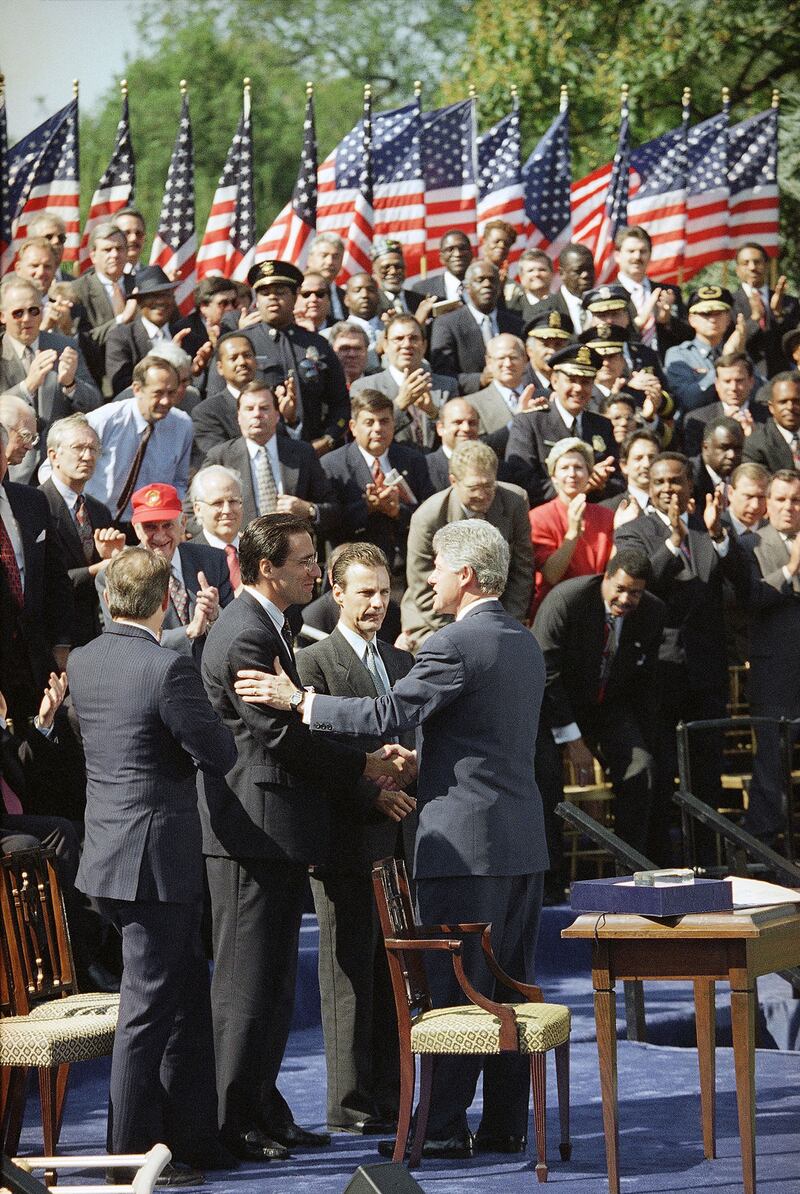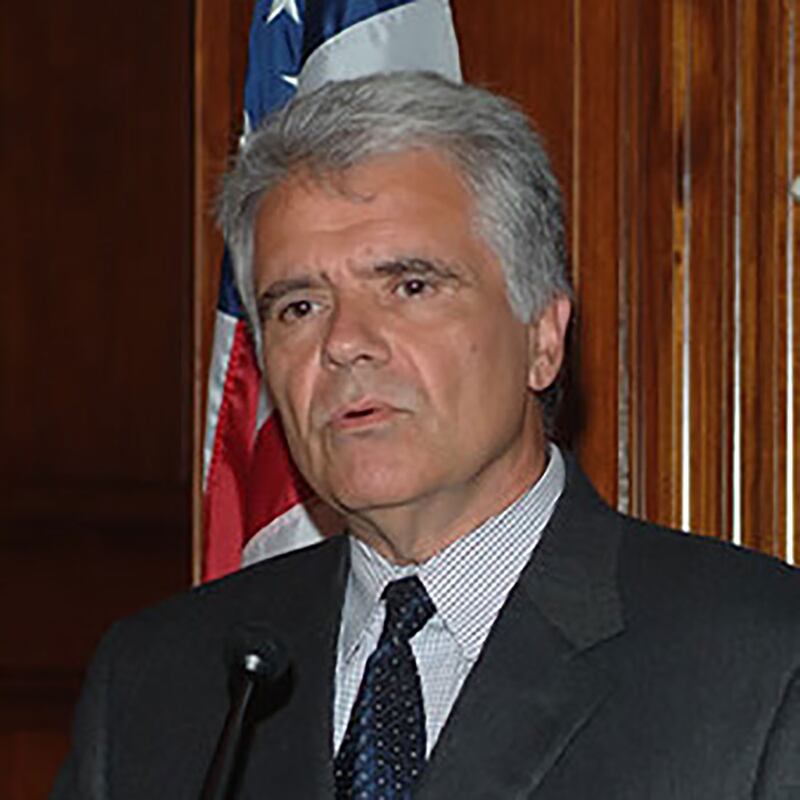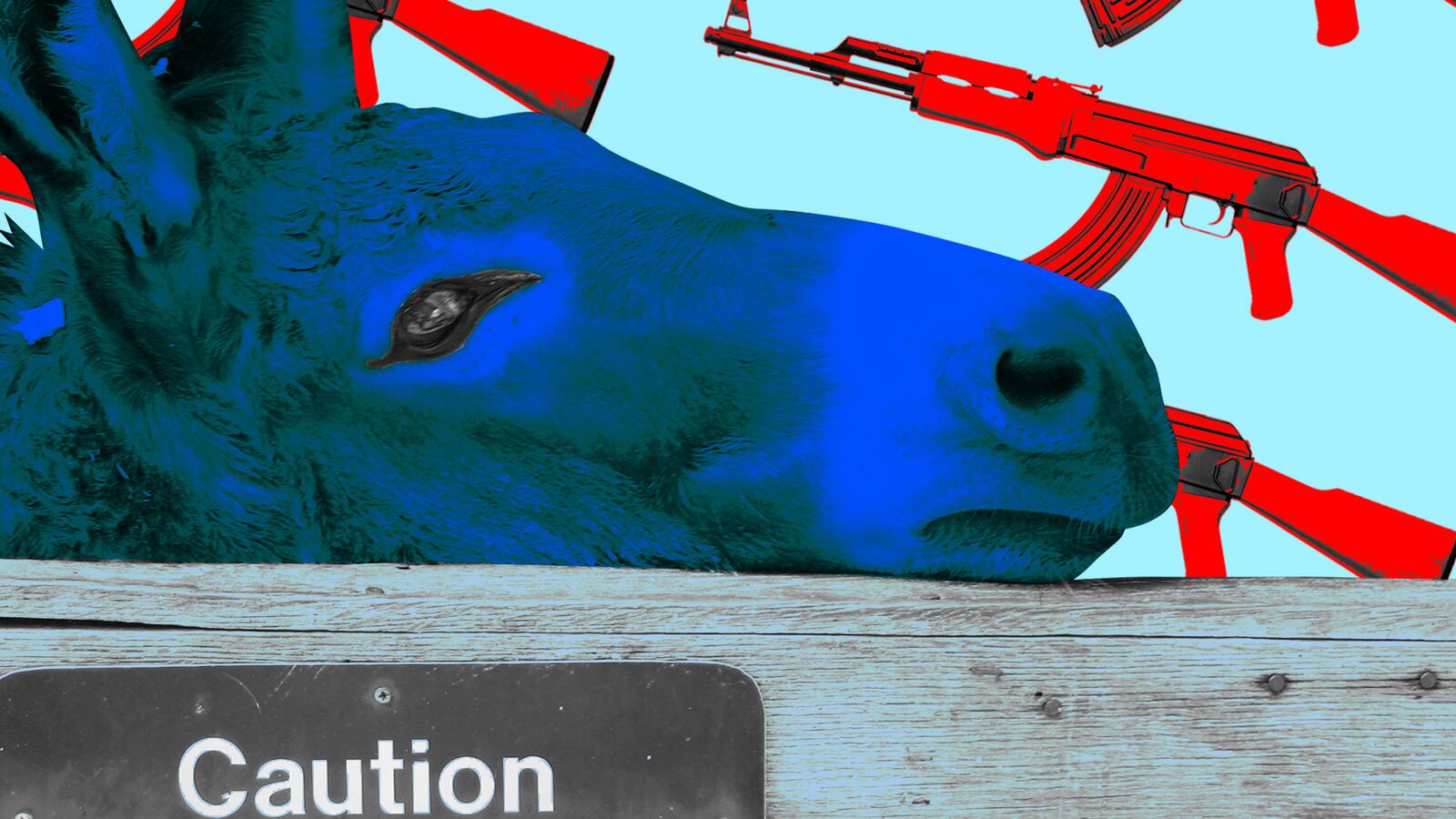Stephen Paddock, the man behind the deadliest mass shooting in modern American history, used a cache of semi-automatic weapons equipped with tools to increase their lethality, when killing 58 concertgoers and injuring 500-plus others.
But in the aftermath of that tragedy, there has been little discussion about banning assault weapons. Part of the reason is simple math. As an aide to Sen. Dianne Feinstein (D-CA) told The Daily Beast, “she tried on assault weapons in the wake of the Sandy Hook shooting and… we lost 40-60.”
Part of it is that the issue is complex. So-called assault weapons are responsible for only a fraction of gun-related deaths in America. And it’s not entirely clear how a ban on them—which was allowed to lapse in 2004—would have affected Paddock.
“The biggest gaping hole in the ’94 ban was that it didn’t get the guns away from anybody,” said Robyn Thomas, the executive director of the Law Center to Prevent Gun Violence. “All it said was no new guns. So if you were willing to spend enough money, you probably could have gotten them.”
Another explanation for why few, if any, lawmakers have broached the idea of reintroducing an assault weapons ban, however, is that many are politically frightened to do so. The lessons Democrats derived from the passage of the 1994 ban is that it is politically poisonous. Some of this has been mythologized by gun rights groups, who benefit from the perception that they can sway elections. But a chunk was internalized by lawmakers themselves.

Senator Diane Feinstein holds AK47 assault rifle during appearance with Governor Gray Davis and police chiefs from around the state to urge Congress to reauthorize the assault weapons ban signed into law in 1994 in front of Parker Center on 08/21/2003.
Bob Chamberlin/Los Angeles Times/GettyThat certainly is the case for Patrick Griffin, who served as Bill Clinton’s chief congressional affairs lobbyist on the Violent Crime Control and Law Enforcement Act, in which the assault weapons ban was included. Months ago, for an episode of the podcast Candidate Confessional, Griffin recounted the efforts to pass that bill and the toll it took on him, Clinton, and Democrats who cast painful votes for the measure. The interview never aired. But you can listen to it here:
His story reflects the complex, divisive politics that surrounds gun legislation—politics that have only gotten more emotionally tricky as time has passed—and the often messy process by which laws are made.
As Griffin recalled, the idea of an assault weapons ban materialized almost accidentally. He and others in the White House thought the idea was bound to be politically toxic. So they tried to “slow walk” the amendment into non-existence—not forcefully pushing for it to be included in the broader crime bill in hopes that it “went away.”
But those plans were blown up at a retreat of Democratic lawmakers in southern Maryland. Griffin had briefed Clinton for the meeting and, deliberately, didn’t put any mention of an assault weapons ban in the materials.
“I’m sitting off to the side and [Dianne] Feinstein who is the subcommittee chair of that committee with jurisdiction says, ‘Mr. President what do you think the status is of the assault weapons ban in the Senate?’ I’m thinking, Why would the chair of the subcommittee who has jurisdiction of that provision—and she was obviously for it—be asking the president this? And Clinton looks at me. He got pissed off that I had embarrassed him. Rather than saying ‘well Madam Chairman, maybe you could tell me.’ He wasn’t agile that way. So, I kind of yelled up some stuff. And that really didn’t go down well at all.”

President Bill Clinton, center-right, shakes hands with Stephen Sposato as Marc Klaas looks on the South Lawn of the White House in Washington on Sept. 13, 1994 after he signed a $30 billion sweeping crime bill that was six years in the making and included a hotly disputed ban on assault weapons. Sposato’s wife was killed when a gunman invaded the San Francisco law firm where she worked, and Klaas’ daughter Polly was kidnapped and killed. "Today, at last, the waiting ends," Clinton said then. "Today, the bickering stops, the era of excuses is over."
AP Photo/J. Scott ApplewhiteThe next morning, Griffin, Clinton, Leon Panetta, and George Stephanopoulos were on a plane back to D.C. “Why didn’t you tell me about this?” a displeased Clinton asked Griffin.
“I kind of took the first few blows. And finally I said, ‘I thought we were just kind of let this go of its own momentum.’ ‘How dare you suggest that. If people knew that I was anywhere but 100 percent.’ I’m looking at Leon. You know, no one is a bastion of strength here. Everybody knew we didn’t want to do this, if we could get away with it. I’m looking at them. Nobody is stepping up and I said; ‘Well, I guess I made a horrible, horrible mistake and we are going to do whatever it takes to get this through.’”
The subsequent weeks were spent scrambling to get the assault weapons ban into the larger crime bill and to figure out a path for moving that larger bill through Congress. Griffin started with the House, where Democratic leadership was already facing pushback. The Congressional Black Caucus was skittish on the larger bill because, among other things, it included 28 new standards for initiating the federal death penalty. Adding a high-profile gun control element risked angering moderates too. They brought leadership into the White House for a meeting.
“It was [Speaker Tom] Foley, [Dick] Gephardt and [David] Bonior and the president, the vice president is there. Leon and George, myself and Harold [Ickes] might have been there as well. I don’t think there were many more. It was a very tight-ass conversation. It wasn’t a big back-slapping type of deal. Leadership said, ‘We are glad to support you on the crime bill and will do what we can.’ And Foley, I think it went this way, said ‘we cannot accept doing the assault weapon ban as part of it. And certainly not in the bill itself as opposed to adding it as an amendment,’ which is what happened. It would have been night and day.
“This is important because if it had been added as an amendment they would have helped us pass the crime bill. As a result of it being in the bill the leadership said you are on your own. You have your own whip operation. We will give you some space. But we are not lifting a finger to pass this bill. And so Leon and I had to build our own little workshop there in developing the 218 [votes needed to pass the bill in the House]. So the interaction around that was tense and these guys were adamant. They said, ‘We’re just not gonna do it.’ They were pissed. And they said this was a mistake. They went through all the politics of it. They were right on in terms of the politics.”
Operating out of a side office on the Hill, Griffin, and Panetta got to work. They went to the Republican leader, Rep. Newt Gingrich (R-GA) who didn’t pledge to fully stop the measure because, in part, he reveled in the divisions it was creating within the Democratic caucus.
“So he said ‘Sure, I’ll help you.’ He said ‘I’m not going to do anything but you can talk to [Mike] Castle’… So I set that up for us. We talked to [former Rep.] Mike Castle. We had then developed a little moderate Republican caucus kind of deal. We made the case and came back a couple times and we got 40 votes out of the Republicans.”
Having 40 Republican votes was a boon. But it by no means guaranteed that the crime bill would pass. To get to 218, Griffin and Panetta had to engage in absurd acts of legislative horse trading. “There was some member who wanted us to invite him to a state dinner with his daughter,” he recalled. “But he had no daughter… Yes, he wanted to take his girlfriend.”
An even more ridiculous moment came later.

“[Bill] Richardson says I can help you... Bill Richardson just wants to be in the action. He is a wonderful entrepreneurial kind of guy. And he says I have got a couple of my buddies in the Black Caucus who I can help you with… so Richardson allows us to use his little tadpole-shaped office for this meeting. [A female CBC lawmaker] is sitting at his desk and he is standing behind her, which is only about two or three feet. And I’m sitting here and Leon is making calls. And literally there is paper rolling around. I don’t know if we had any secretarial support. We must have. But it was really an on the fly operation.
“She says to me, ‘I had a dream.’ She says ‘I had a dream and Jesus came to me and said that if you can get this Indian casino open and get the jobs that my people need, I can find a way to do what is important on protecting crime…’ I said, yeah, ‘I hear ya. I hear ya.’ She went on. She wasn’t in a trance but she was kind of looking up. I couldn’t look at her... Richardson is behind her making faces...
“At that time, I didn’t know if you remember or were aware of, but compacts were a big thing. It was when reservations were working with the government to go through this process of becoming truly independent; not truly but independent where they could do commercial stuff. And it was stuck some place. And she’s saying, ‘I believe Jesus would be ok with this.’ And I said, ‘I know we would be. But let me check with Leon.’ I’m just dying. Leon is doing the same thing with somebody else. And I said, ‘Leon, this is the deal.’ And he looks at me and said, ‘What do we have to do?’ I said, ‘We have to call [Interior Secretary Bruce] Babbitt.’… So I call him up and say ‘Mr. Secretary, we need you to at least facilitate this next move.’ It wasn’t given any certainty to it. But it at least got the thing down the road. And he just went batshit on the phone. I said ‘Leon he is upset.’ He said, ‘He’s not going to be more upset than I am if we don’t move this through.’ And as we are doing this, Bonoir comes walking over, because we are in this open room, who has spent most of the last few years trying to fight this. And we are giving it away in front of him. I said to David, ‘Sorry buddy.’ So we signed it on to the next step. It never went much further than that. And we got her vote.”
The day of the House vote, Griffin refused to head to the Hill, sickened by the idea that the party was going to pass a measure that he believed would doom them politically. His staff eventually prevailed on him to do so. And he watched the vote from off to the side, hoping that it would go down in defeat. It didn’t.
“So mostly everybody is like jumping for joy. And I’m walking around like a zombie. But nobody really gave a damn what my feelings were. So I went back to the office and I got a call from Congressman [Jack] Brooks who is the congressman from Texas and Chairman of [the Judiciary] committee and he said, ‘Well you just lost me my seat.’ And he and I had a good relationship. I said, ‘Well, you voted against it. The president doesn’t want you to do anything going forward that would jeopardize you. And if we come back from the conference and all that stuff…’ And he was just really down, down, down… He said, ‘my seat is done.’”
Brooks had, at that point, served in the House for more than 40 years. He was an institution. Griffin convinced Clinton to give him a call to cheer him up. Shortly after, Clinton called Griffin.
“[Clinton] says, have you finished partying? And I said, ‘I haven’t partied Mr. President. I don’t see anything to party about.’ He said, ‘Why the hell did you have me call Brooks?’ He said, ‘He’s really upset.’ And I said, ‘Well that’s why I had you call.’ And, so, you know, it reflected his anxiety knowing it wasn’t going to get better from there.”
And they didn’t, at least not politically.
Passing the bill in the Senate was not easy. But it was not as complicated in the House. By then, the political pressures being put on Democratic members were growing notable and enormous. The failures of health care reform and the passage of a controversial budget had already set the stage for a difficult election year. The assault weapons ban added a massive dose of gasoline.
In all, eight Democratic Senators lost their races and 54 Democratic House members too. The list included those who opposed the assault weapons ban but reluctantly voted for it (like Speaker Tom Foley) and those who had tried to strip the crime bill of the assault weapons ban, like Brooks.
As part of the crime bill, the ban was to sunset in ten years. By the time that date approached, Clinton was out of office and his predecessor, George W. Bush, made little attempt to renew it. There was only one other real effort to pass an assault weapons ban since then. Feinstein’s bill after Sandy Hook fell significantly short of 60 votes needed for cloture.
“People were getting increasingly afraid that it was going to be Armageddon,” Griffin said of the ’94 elections. “And it was.”






